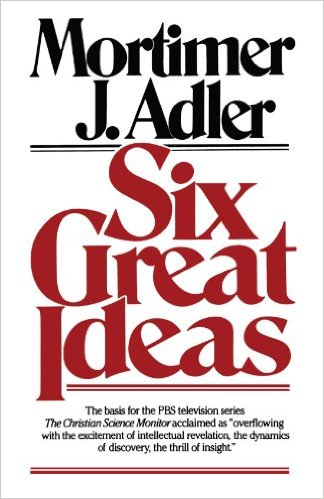|
Word Gems
exploring self-realization, sacred personhood, and full humanity
Dr. Mortimer J. Adler's
Six Great Ideas
|
Justice, Freedom, and Equality are aspects of Goodness, but not uniformly so.
|
return to 'Six Great Ideas' main-page

|
Editor's note:
Excerpts from Six Great Ideas are offered below, indented format; plus, at times, my own commentary.
|
In treating the ideas of truth, goodness, and beauty, I dealt
with each in itself and for its own sake before considering its
relation to the other two. Turning now to the remaining three
of the six great ideas—liberty, equality, and justice—I will pro-
ceed somewhat differently. Though I will examine each of these
ideas in and for itself, I will be primarily interested in those
aspects of them in which they are closely interrelated. It is in
those aspects that this triad of ideas are the ideas we act on in
governing our social, political, and economic affairs.
In the case of the first three ideas, we observed the sover-
eignty of truth in the way it regulates our thinking about good-
ness and beauty. So here, in dealing with the second set of
ideas, we must note the sovereignty of justice. It regulates our
thinking about liberty and equality. Without its guidance, cer-
tain errors are unavoidable and certain problems insoluble.
It should also be pointed out that all three of these ideas fall
in the domain of the idea of goodness. We rightly regard liberty
and equality as highly desirable goods, real goods that we need
to lead decent human lives in the pursuit of happiness. Just
action with respect to others, as we saw in an earlier chapter, is
the good of doing. To act rightly or justly is to do good.
It is necessary to explain the sovereignty of justice with re-
gard to liberty and equality before we embark, in subsequent
chapters, on elucidating these ideas as well as exploring in de-
tail the idea of justice itself. Readers will appreciate, I trust, that
their understanding of what is said briefly here will be increased by the light that subsequent chapters will throw on the subject.
In the popular mind, and even in the opinions of the learned,
either liberty, or equality, or both together, is accorded the
highest honor as the prime value or values to be sought, se-
cured, and preserved. Much more inflamed rhetoric, as well as
much more reasoned argument, has called for liberty above all
else, or for equality above all else, or for both together, than
there have been appeals for justice first and foremost.
The maxim of the French Revolution still echoes in our ears:
liberte, egalite, fraternite. Justice is not even mentioned in the
company of the other two. That might have been justified had
the authors of that maxim written it on the basis of Aristotle's
insight that if all human beings who are associated in a com-
munity were friends with one another, there would be no need
for justice. It is doubtful that they had this in mind.
Against the weight of both popular and scholarly opinion, I
will try to explain why justice is the supreme value, a greater
good than either liberty or equality, and one that must be ap-
pealed to for the rectification of errors with regard to liberty
and equality.
As I observed a moment ago, all three of these values are real,
not apparent, goods—goods that human beings need for the
conduct of their lives in the pursuit of happiness. However, all
real goods are not of equal standing. Wealth and health, for
example, are inferior to wisdom and friendship. Some real
goods are truly good only when limited. Pleasure is a real good,
but we can want more pleasure than we need or more than is
good for us to seek or obtain. The same is true of wealth. These
are limited real goods. In contrast, knowledge is an unlimited
real good. We can never seek or obtain more than is good for
us.
Only justice is an unlimited good, as we shall presently see.
One can want too much liberty and too much equality—more
than it is good for us to have in relation to our fellowmen, and
more than we have any right to. Not so with justice. No society
can be too just; no individual can act more justly than is good
for him or for his fellowmen.
|
